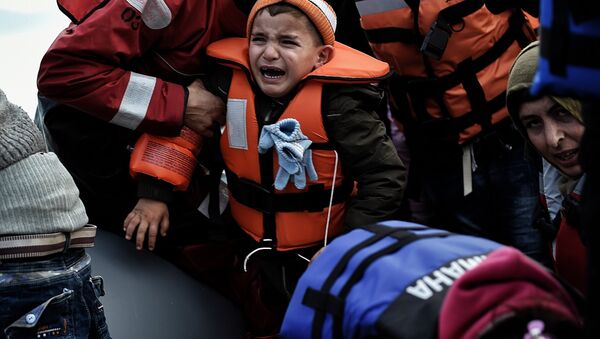"I am very worried about the news that we are getting about increasing closures of European borders along the Balkans route because that will create further chaos and confusion," Filippo Grandi, head of the UN refugee agency said during a recent visit to the Greek island of Lesbos.
Lesvos: speaking w/refugees from #Syria just rescued by @HCoastGuard: others will follow unless war stops. pic.twitter.com/ri05oBHV8h
— Filippo Grandi (@RefugeesChief) February 23, 2016
Thousands of refugees and migrants remain trapped in Greece after Macedonia introduced more scrutiny of documents and passports, belonging to all Syrians and Iraqis, as well as stopping all Afghans from crossing the border.
"It will increase the burden on Greece which is already shouldering a very big responsibility in managing these people," Grandi said.
The imbalance of responsibility for refugees falling on Greece's shoulders was reiterated in a tweet by Peter Sutherland, UN special representative for international migration who claimed it was "an outrage":
It is an outrage that Greece has to carry a disproportionate burden in the EU simply because it is situated where it is. No sharing.
— Peter Sutherland (@PDSutherlandUN) February 24, 2016
Greece has been given three months to regain control of its external borders and process every asylum seeker and migrant properly. If by May 2016 Greece fails, the European Union will allow all other members of the Schengen zone to reinforce its borders for up to two years — essentially leaving Greece cut off.
Europe has two choices according to Vincent Cochtel, director of the UN refugee agency:
"Orderly relocation [and] return or chaos again."
However Hungary, the Czech Republic, Slovakia, Slovenia, France, Denmark and the UK have all rejected the proposed quota system to relocate asylum seekers among member states, which still leaves Greece to manage the "chaos."
Graves With No Names
The number of people migrating to Greece is expected to surge this summer. 880,000 people have arrived in the southern European country since 2015 and it's estimated that over 45,000 have already arrived this year alone. Greece, however, remains under huge scrutiny by the European Commission on how it responds to the crisis.
Elderly refugees in Lesvos who survived dangerous journey. Crucial to offer legal options to people seeking safety. pic.twitter.com/UMmoE44vd4
— Filippo Grandi (@RefugeesChief) February 23, 2016
The reality of the crisis can be seen on the ground on the island of Lesvos.
#refugee crisis, the absence of legal pathways leads to kids' graves in Lesvos, can't we avoid this? pic.twitter.com/4FR15Whul4
— vincent cochetel (@cochetel) February 23, 2016
"The saddest grave I have ever seen. A refugee child who drowned off the Greek island of Lesvos with no name."
Elsewhere in France, 423 unaccompanied child refugees are living in a camp facing demolition in Calais.


